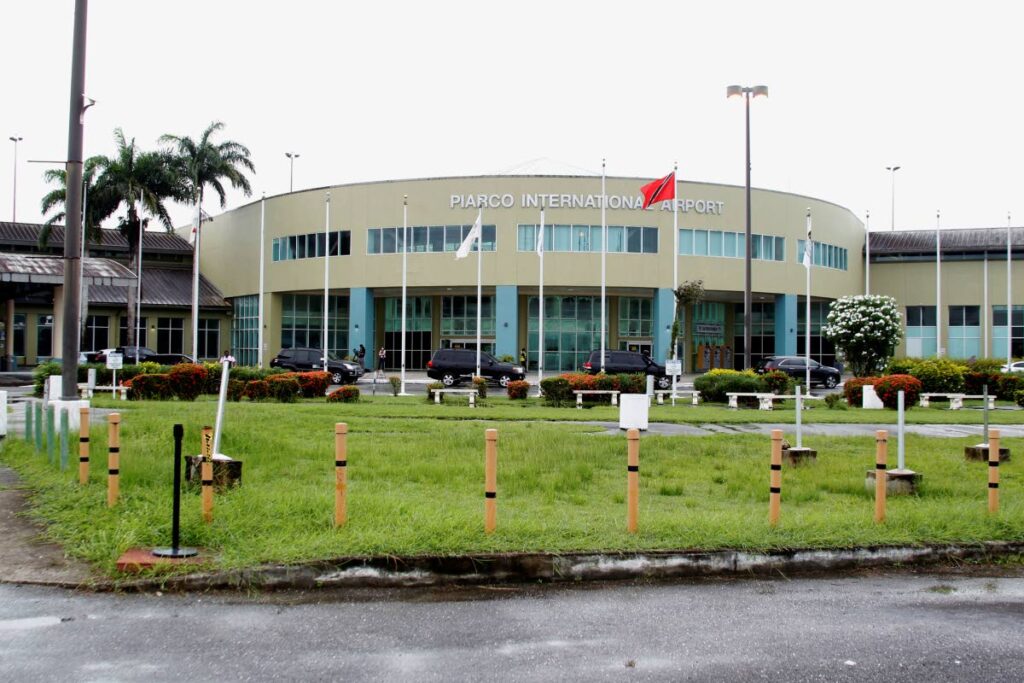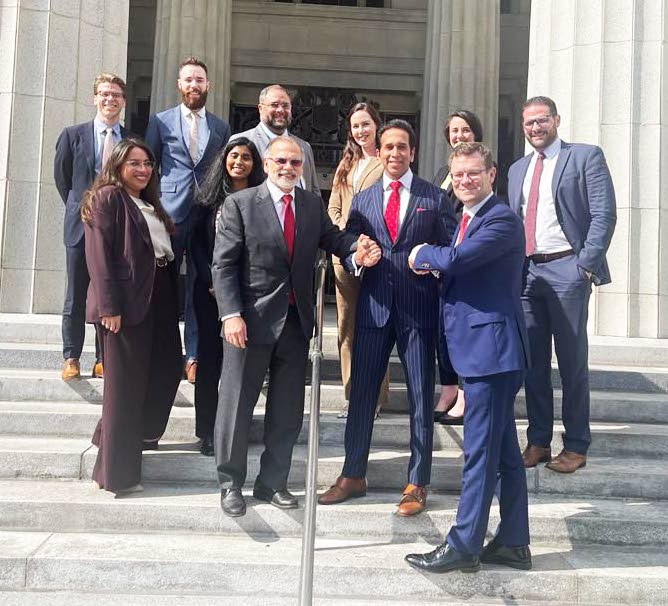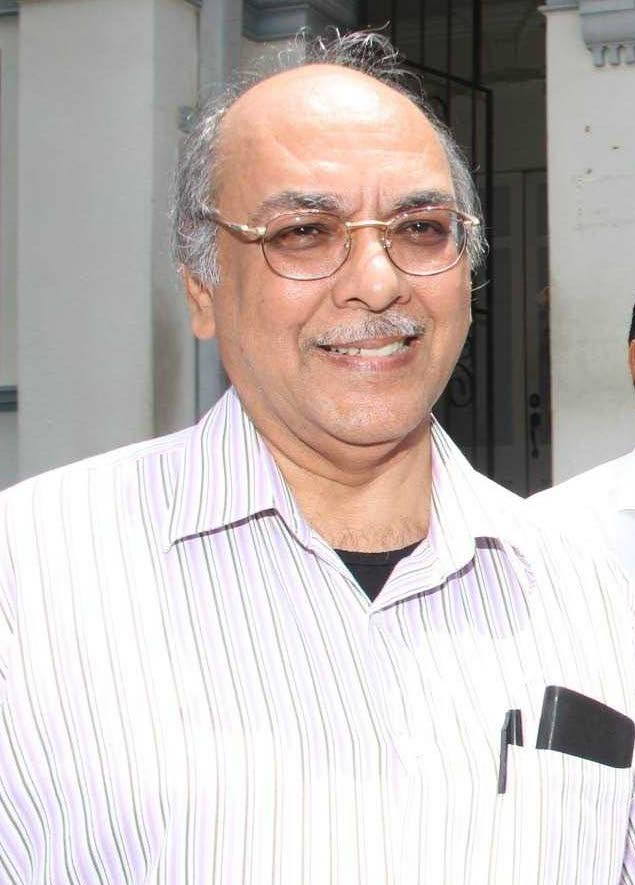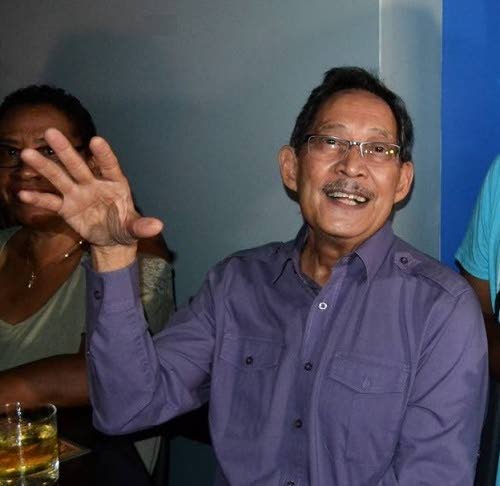Long road to justice – Miami verdict, first victory in Piarco corruption case

The verdict in the civil asset forfeiture case filed against people accused of serious criminal conduct linked to the construction of the Piarco Airport development project almost three decades ago is the only outcome in a complex fraud case that has dragged on in both local and foreign courts at snail's pace.
On Wednesday, a jury in a Miami, Florida found former government minister Brian Kuei Tung, Maritime Insurance executive Steve Ferguson and co-conspirator Raul Gutirrez Jr, who were accused of corruption in the award of contract in the airport project guilty. The government can now seek up to US$100 million in compensation.
In its Miami claim, the State claimed that Ferguson, Kuei Tung and Gutierrez fraudulently engaged in a scheme to overcharge TT for three contracts related to the airport project and that this “Piarco Airport Enterprise” conspired to ensure that overpriced bids submitted by the companies they controlled would be chosen to perform the contracts.
“The Republic claims that Steve Ferguson, Brian Kuei Tung, and Raul Gutierrez, Jr., as members of the Piarco Airport Enterprise, engaged in mail fraud, wire fraud, money laundering, and the destruction of evidence in furtherance of their scheme to defraud,” read the instructions given to the jury by Miami-Dade Circuit Court Judge Reemberto Diaz.
Those three, TT’s hundred-page complaint said, were “the masterminds of this scheme.”
On March 30, the Prime Minister rejoiced the court's ruling, on the morning of the Spiritual Shouter Baptist Liberation Day holiday, with a succinct Facebook post that read, “Great Day in the Morning,” typed in all-caps, with a TT flag emoji, perhaps to emphasise his adulation with the verdict.

Accompanying Dr Rowley’s post were the front pages of the three daily newspapers which reported on the ruling of the Miami jury the day before.
Hours after the Government’s Miami win, former attorney general Faris Al-Rawi, who was credited with salvaging the multi-million dollar civil assets forfeiture lawsuit for the Government, hailed it as a “victory for the people of Trinidad and Tobago.”
Al-Rawi was in Miami since the start of the civil trial on March 6. He resumed the position of the Government’s representative – which he previously held when he was the attorney general – when the Florida courts disqualified his successor Attorney General Reginald Armour, last year because Armour had once defended Kuei Tung before the local courts.
The Government began litigation in 2004 in the US to recoup US$37 million from those accused of corruption, among them Ferguson and Kuei Tung. Kuei Tung served as finance ministers in both PNM and UNC administrations.
When the case was filed, Miami attorney for TT, Edward H Davis Jr, said, “This case puts Trinidad and Tobago in the vanguard of countries prosecuting public corruption. It sends a clear signal to those who engage in fraudulent activities that they are going to be held accountable."
Initially, there were 56 defendants in the lawsuit originally filed by former attorney general John Jeremie, SC – Kuei Tung, Ferguson and various other businessmen and companies in Florida, Panama and Portugal. Over the years, some accepted plea deals so by the time the State filed its fifth amended complaint in April 2007, only three remained when the trial began: Ferguson, Kuei Tung, and Gutierrez Jr who, the State maintained, had conspired with others to corrupt the bidding process on two construction packages, as well as the maintenance contract for the Piarco International Airport.
In April 2016, the court granted summary judgement against Gutierrez, concluding he was liable for fraud and violations of Florida’s RICO (Racketeering and Influenced Corrupt Organisations) law.

Gutierrez, a former executive of Calmaquip, one of the US companies which won contract in the airport project, pleaded guilty in 2006 to charges of conspiracy to commit wire fraud and transportation of stolen property in violation of US federal law related to his involvement in the Piarco project.
In October 2019, the court entered a default judgement against Kuei Tung for refusing to attend his deposition to answer questions about the case.
The default resulted in liability against Kuei Tung for the same claims. In addition, the court also determined that Kuei Tung was liable for conspiracy to commit fraud.
Some 19 years after the lawsuit was filed, the four-week jury trial began to determine liability against Ferguson and the damages the others were liable to pay.
“We got everything that we asked for,” Al-Rawi said afterwards from Miami. “This represents restitution to the people of Trinidad and Tobago.”
He was also unfazed by assertions by Ferguson and Kuei Tung they intended to appeal Wednesday’s verdict which, they said, was based on “misleading, inaccurate, false and fabricated” information.
In an interview with Newsday on Thursday, Ferguson said several elements of the case were prejudicial and confirmed that appellate attorneys have begun working on filing an appeal.
He also accused Al-Rawi of entering false statements during the trial.
Referring to issues that were raised when Kuei Tung was unable to attend a deposition owing to eye surgery on the same day, Ferguson said he was concerned his fellow defendant was not treated fairly.

"There are a whole host of things and other legal issues that were highly prejudicial.
"The jury instructions were that Mr Kuei Tung was guilty, how can you start a trial by saying someone is guilty?
"Brian Kuei Tung had eye surgery on the day of the deposition and the surgery was urgent, so he was unable to attend the deposition.
"The judge struck off his entire defence and considered him guilty and then gives the jury the directions that Mr Kuei Tung is guilty.
"It was obscenely ridiculous. It is a real farce and our attorneys have already assured us that they will do it (appeal).”
Gov't to go after those with deepest pockets
The lawsuit alleged that the defendants participated in a scheme beginning in August 1996 to illegally obtain consulting and construction contracts at hyper-inflated prices through bribes, bid rigging and money laundering linked to an expansion of the Piarco International Airport. The cost of the project was put at $1.6 billion.
Kuei Tung’s attorney, Michael Garcia, was reported in an article in the Washington Post as saying he intended to appeal. He also reportedly said the Government lacked standing to sue and that he believed the plaintiff should have been the Airports Authority.
“These defendants were not responsible for any losses Trinidad and Tobago contends it sustained.”
The article in the Post also quoted Al-Rawi as saying the Government will go after those with the deepest pockets, noting that one of the businessmen who was sued owns a large insurance company in TT that recently placed a US$1 billion bid to buy another local company.
Al-Rawi said in the Post that the money the government recovers from the Miami judgement can be used to build schools or provide healthcare.
The total figure of the sums paid to prosecute the case in Miami is not yet quantified but the $13,581,973.55 paid to Miami law firm, Sequor Law – from 2018-June to 2021 according to information posted on the Parliament’s website for 2015-2021 – will not be recoverable as the firm was also disqualified along with Armour last year.
The Miami case was not the only one before the courts locally and in the US but was the only one that has gone to trial.
In 2006, a grand jury in Florida indicted businessman Ishwar Galbaransingh, Ferguson and six US businessmen for alleged corrupt practices.
The Americans pleaded guilty in a Florida federal court and were sentenced to terms between six months and six years. They also agreed to restitution.
Galbaransingh and Ferguson had waged a legal battle against their extradition, arguing that they were already facing criminal proceedings in Trinidad over the Piarco airport scandal and should not be tried in the United States.
They were successful in their extradition fight when, in 2011, a judge ruled against the decision of the then attorney general Anand Ramlogan to sign extradition warrants against them a year earlier. Justice Ronnie Boodoosingh said TT was the appropriate forum to try the two and held that Ramlogan’s decision was “unjust and oppressive.”
In September 2012, a week after presidential assent to the Administration of Justice (Indictable Proceedings) Act 2011, which included the controversial section 34 clause, some of those charged in the Piarco corruption cases applied to invoke the law. That section introduced a ten-year statutory limitation period for some criminal prosecutions but was short-lived as it was in force for only two weeks before Parliament repealed it.
On the same day the trial started in Miami, Director of Public Prosecutions Roger Gaspard, SC, discontinued one of four preliminary inquiries in the local courts involving fraud and corruption charges arising out of the airport construction project.
That case – dubbed Piarco 3 – involved former prime minister Panday, his wife Oma, former government minister Carlos John and businessman Ishwar Galbaransingh. Gaspard said the decision to withdraw the case was based on the State having a low chance of conviction and that key witnesses were unavailable.
The other inquiries are still “active,” but are bogged down by several legal challenges.
At a political meeting on March 6, Opposition Leader Kamla Persad-Bissessar dismissed the Piarco charges as a blatant case of political persecution to stay in power. “The case was never meant to succeed in court. All it was meant to do was to drag out as long as possible to have the UNC seem like corrupt people.”
The UNC leader said she would await the appeal of the Miami verdict before commenting on the case. But the Prime Minister immediately denounced the “political prosecution” claim.
The Piarco corruption cases
There were four inquiries arising out of the corruption charges in the Piarco airport construction project.
In the Piarco 1 matter, the first group were charged in 2002, with offences alleging theft of $19 million during the construction of the Piarco Airport terminal between 1995 and 2000.
In 2019, Gaspard told Newsday he was still considering his options in the Piarco 2 matter.
The Piarco 2 prosecution had to be restarted as a result of a ruling of the High Court in 2022.
On March 6, the Piarco 3 prosecution collapsed.
The Piarco 4 prosecution was completed in 2020. Piarco 4 involved businesswoman Renee Pierre. She was committed to stand trial in March 2020. Pierre was one of eight people, including former government ministers and party financiers for the United National Congress, charged back in 2004, in connection with the airport corruption case. In 2005, the original charges against Pierre were dropped and reinstated with new charges, which led to her case being separated from the Piarco 1 and 2 corruption inquiries.
In all, there are four related inquiries, none of which have gone to trial. They were considered to be the biggest corruption case in TT’s history, with allegations of corruption, bid-rigging, kickbacks, bid inflation, political interference and fraud.
Panday was at the time, prime minister leading a United National Congress Cabinet (1995-2001), which in September 1996, appointed a task force to expedite the airport project. At the time, Galbaransingh was a member of that task force while John was minister of works.
The charges were laid during the People’s National Movement (PNM) administration by then-acting Insp John Telesford. Since then, there have been multiple legal challenges in all the cases, a commission of inquiry and an investigation by a forensic financial expert.
Investigations and public enquiries
A 1997 report by retired Justice Lennox Deyalsingh revealed that a main contractor on the project was guilty of unethical conduct and called for an end to the contracts that had been awarded. They were not.
Three years later, Canadian financial forensic investigator Robert Lindquist was appointed to investigate the project by then-attorney general Ramesh Lawrence Maharaj, SC.
Lindquist’s website says an interim report was delivered two months before the general election on December 2000, and while the UNC won, his investigation did not continue.
Maharaj and two other ministers resigned from the Cabinet over the inability to obtain funds for the Anti-Corruption Unit to continue this investigation, the website said, and a new election was called in December 2001 which resulted in the 18/18 deadlock.
The PNM’s Patrick Manning was selected to become prime minister and Lindquist was asked to return and resume his investigation.
His report allegedly uncovered 11 schemes outlined as price fixing and bid rigging, duplicate contract payments, false invoicing, defective pricing, co-mingling of contracts, conflict of interest, false representation, improper release of confidential information, product substitutes, tailored specifications, and time limitations.
In 2007, three US-based consultants and engineers on the project pleaded guilty to fraud-related charges and were sentenced to prison terms ranging from six months to six years. They also agreed to pay US$4 million each in compensation to TT.
In 2002, retired Chief Justice Clinton Bernard was selected to lead a commission of inquiry and a final report was delivered to former president George Maxwell Richards on August 31, 2003. Its findings have never been made public. Both Bernard and Richards have since died.


Comments
"Long road to justice – Miami verdict, first victory in Piarco corruption case"